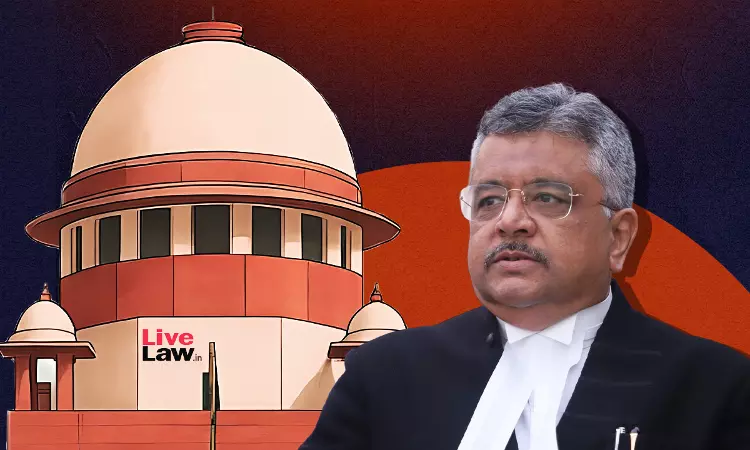- Home
- /
- Top Stories
- /
- Dr.Ambedkar Opposed Setting Time...
Dr.Ambedkar Opposed Setting Time Limit For President To Decide On Bill's Assent : Solicitor General Tells Supreme Court
Gursimran Kaur Bakshi
19 Aug 2025 7:30 PM IST
Not setting time limits was a conscious omission by the Constituent Assembly, the SG said.
In the Presidential Reference on the issues relating to the granting of assent to Bills, Solicitor General of India Tushar Mehta told the Supreme Court today that the Constituent Assembly had consciously omitted to set timelines for the President and the Governors to act on Bills.He submitted that Dr.BR Ambedkar had moved an amendment to delete the time limit of six weeks proposed for...
In the Presidential Reference on the issues relating to the granting of assent to Bills, Solicitor General of India Tushar Mehta told the Supreme Court today that the Constituent Assembly had consciously omitted to set timelines for the President and the Governors to act on Bills.
He submitted that Dr.BR Ambedkar had moved an amendment to delete the time limit of six weeks proposed for the President to grant assent to money bills under Article 111.
Referring to Section 68 of the Government of India Act, 1915, and Section 32 of the Government of India Act, 1935 and the Constituent Assembly debates, SG Mehta submitted that Ambedkar moved an amendment to replace 'not later than six weeks' introduced by Dr BN Rau in draft Article 91(now Article 111) with 'as soon as possible'. He pointed out that a member of the Constituent Assembly, H.V. Kamath, had opposed this amendment, calling the term vague and meaningless and raising the apprehension that the President may not always act idealistically. However, Dr Ambedkar's amendment was adopted.
A Constitution Bench headed by Chief Justice of India BR Gavai and comprising Justice Surya Kant, Justice Vikram Nath, Justice PS Narasimha and Justice AS Chandurkar was hearing the Reference made by President Droupadi Murmu concerning the powers of the Governor and the President under Articles 200(assent to Bills) and 201(bills reserved for consideration) of the Constitution.
One of the issues raised in the Presidential Reference is in regards to whether, in the absence of constitutionally prescribed time limits, timelines can be prescribed by the judiciary for the exercise of powers of the President under Article 201 and the exercise of the Governor under Article 200.
This comes after in Tamil Nadu judgment, a bench comprising Justice JB Pardiwala and Justice R. Mahadevan fixed an upper limit of three months for the Governor's decision. If the Bill is reserved by the Governor for the President's assent, the President must act within 3 months, the Court further ruled.
Solicitor General, representing the Union Government, submitted, "There was a timeline proposed. It was done away with consciously-conscious omission on the part of the Constituent Assembly"
SG Mehta argued that the highest head of the executive can't be bound by the time limit. "Kindly mark these words, the draft contained a timeline and Dr Ambedkar was pleased to suggest that- remove this timelimit, and make it- 'as soon as possible'."
When CJI Gavai asked if no timeline was prescribed at all, SG Mehta replied that there was a timeline even under the Government of India Act and then by Dr BN Rau, but it was sought to be deleted for "good reasons". "Ultimately, the power is conferred to the highest executive, he may not be bound by the time limit that you better decide within six weeks. We always follow a system that the highest constitutional functionaries will discharge their duties in accordance with law," SG said.
SG also pointed out that one of the Constituent Assembly members had also suggested substituting 'as soon as possible' with 'as soon as may be' but that was not accepted. Considering the discussions as read by the SG in the Constituent Assembly debate, CJI said: "So the discussion appears to be, it [Bills] have to be done within a reasonable period of time."CJI added that some of the members in the Constituent Assembly thought that even the six-week period is longer.
Responding, SG said: "Don't bind the President down, that is the idea."
CJI added: "One of the hon'ble members suggested that as soon as possible but not later than six weeks."
SG Mehta replied, "There can't be any timelimit to bind the President of India for doing something."
CJI responded, "We can take into consideration the debates in the Constituent Assembly while interpreting the provision."
The hearing will continue tomorrow.
Live updates from today's hearing can be followed here.
Also from today's hearing - 'We'll Be Just Expressing A View On Law, Not On TN Governor Decision' : Supreme Court On Presidential Reference Over Bill Timelines
Case Details: IN RE : ASSENT, WITHHOLDING OR RESERVATION OF BILLS BY THE GOVERNOR AND THE PRESIDENT OF INDIA|SPL.REF. No. 1/2025



